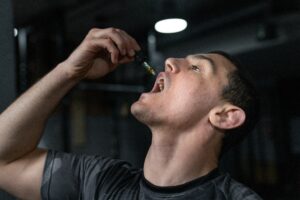“The most important decision we make is whether we believe we live in a friendly or hostile universe.” – Albert Einstein
When was the last time you thought the world was a friendly place?
That simple question can help determine the state of your Endocannabinoid System. This biological system, discovered in 1992 by researchers in Israel, has paved the way for identifying the healing properties of cannabidiol, also known as CBD.
What is the Endocannabinoid System?
Along with mood, the Endocannabinoid System controls appetite, pain, sleep, and cognition. Endocannabinoid and cannabinoid receptors make up this system. Cannabinoid receptors, called G-coupled receptors, are ubiquitous throughout the body, particularly in the hippocampus, amygdala, cerebellum, and basal ganglia. Interestingly, pharmaceutical drugs use the exact mechanism to affect the body.
Five types of receptors were found. CB1 is located in the brain and nervous system, CB2 is in the immune and nervous system, and the rest (CB3-5) are still being researched.
The two compounds that activate the receptors are naturally produced by the body and are called anandamide (arachidonoyl ethanolamide), also known as the Bliss molecule, and 2-AG (arachidonoyl glycerol). The brain, spleen, heart, and uterus possess these molecules. Phytocannabinoids, on the other hand, are unique compounds that plants produce.

What is CBD?
CBD or cannabidiol, is a molecule in the Cannabis plant and is considered the second most prevalent of the active ingredients. Unlike its psychoactive cousin, THC (Tetrahydrocannabinol), there is no evidence that CBD has any abusive or dependence potential. On the contrary, CBD is shown to have significant medical benefits.
Determining Need
Pain, anxiety, and inflammation are the body’s mechanisms to protect itself from long-lasting harm and trauma. When the body is not in balance, it reacts by providing symptoms that will hopefully trigger a behavioral change.
By increasing the levels of anandamide and 2-AG through the intake of CBD, balance can be achieved. This helps regulate pain, which, in turn, can reduce pain perception and improve mood. CBD may also limit inflammation in the brain and nervous system, which may benefit people experiencing anxiety, insomnia, and neuropathic conditions.
Intake Method
How to take CBD is dependent on how fast you want the molecule circulating in your bloodstream, also known as bioavailability. One important thing to take into consideration is that the faster the molecule goes in, the faster it goes out of the body.
For immediate relief, vaping and smoking are the fastest way since the molecule immediately goes into the lungs and spreads throughout the body rapidly. For people with high anxiety, this will help calm the nerves. The effect usually lasts for 2 hours.
The next mode is CBD Oils. Drops are placed sublingual (under the tongue). The effect can be felt within 15 minutes and can last from 4-6 hours.
The longest to absorb are the gel caps since it has to go through the digestive system. It takes about an hour, but the effect lasts from 8-10 hours. For those folks who suffer from insomnia, this is the best one to take since it can help people fall asleep and stay asleep.
From bath bombs to lotions and creams, there are other ways of taking CBD. Taken this way, the molecule addresses localized pain and can offer relief from arthritic pain and muscle aches. Edibles are also a consideration, but most are made using isolates to maintain consistency during manufacturing. The CBD molecules extracted from the rest of the plant material, called Isolates, create a relaxation effect. However, they do not come with the other expected benefits of inflammation reduction.
Sometimes, the best way is to combine both internal and external consumption to help heal the body. Internal addresses the inflammation, why external helps relieve the pain.

Dosage
The amount to take is dependent on the number of receptors the body has. This is where the ability to observe and take note of the internal and external manifestations is crucial to dosage.
Questions to ask yourself:
How do you see the world?
Do you feel safe?
How is your sleep?
What is your current pain level?
How is your appetite?
Start with a low among (6-10mg) and increase by 2 mg every hour until you reach your desired effect when taking CBD. There shouldn’t be any concern about overdosing since the body will naturally excrete any excess. Some potential side effects are fatigue, and diarrhea and it may affect the absorption of other medications so consulting a doctor before using CBD is in order.
Where can you purchase CBD?
Although bodegas are convenient and have a variety of products, it is not necessarily the best place to buy CBD. Gas stations are a close second. The quality and efficacy may be questionable.
CBD should be purchased from knowledgeable establishments where you can have conversations that can address concerns, have questions answered, particularly if you are taking medications, and provide alternatives.
Education first!
To learn more about CBD and its many wonders, check out our events page to take a class on plant medicine in person
You can also study at your own pace at our Evergreen content.

